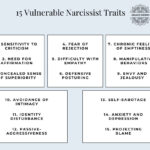10 Things Narcissists Do When You Go No Contact
Knowing about the things narcissists do when you go no contact can be a maze of uncertainty and suspense. Many grappling with this decision find themselves torn between the desire for a final word and the dread of re-engagement.
This article aims to illuminate the unpredictable path ahead, discussing topics such as the narcissist’s reaction to you going no contact and the effects of no contact with a narcissist.
For those who are feeling ready to assert their boundaries, we’ll explore some strategies at the end on how to tell a narcissist to stop contacting you.
10 Things narcissists do when you go no contact
When you initiate the no contact with narcissist rule, it marks a pivotal shift in your relationship dynamics. Going no contact with a narcissist can feel like stepping into uncharted territory, leaving you wondering what happens when you stop talking to a narcissist.
This silent boundary often prompts a range of reactions from them, each revealing more about their mindset and narcissist traits.
Here are 10 things narcissists often do when you go no contact:
- Attempt to Reestablish Contact: They might send messages or try to call, disregarding your boundaries. This is also known as hoovering, as the narcissist tries to lure you back into the toxic narcissistic abuse cycle.
- Play the Victim: Narcissists may portray themselves as the wronged party to gain sympathy, one of the characteristics on the narcissist checklist.
- Spread Rumors: They might start to spread false information about you to others.
- Stalking or Monitoring: Keeping tabs on your activities through social media or mutual contacts.
- Emotional Blackmail: Using emotional tactics like narcissist gaslighting to make you feel guilty or responsible for their well-being.
- Lashing Out: Displaying anger or frustration due to the loss of control over you.
- Bargaining: Offering promises of change or better behavior in an attempt to resume contact.
- Using Mutual Connections: Reaching out to friends or family to relay messages or gather information.
- Sudden Kindness or Generosity: Unexpectedly acting nice or giving gifts to lure you back. This is when the narcissist starts love bombing you again to lure you back into the relationship.
- Disappearing Act: In some cases, they might completely withdraw, giving you the silent treatment in return as a form of punishment.
Related: How Does a Narcissist React When They Can’t Control You?
Does it bother a narcissist when you don’t care?
Absolutely. Narcissists thrive on attention and validation due to their self-esteem and self-views. So when you stop reaching out to a narcissist, it disrupts their sense of control and significance. This no-contact effect on the narcissist can trigger various reactions, reflecting their discomfort and inability to handle indifference.
When you go no contact with a narcissist, it’s like cutting off their supply of emotional energy. They are used to having an audience for their behaviors and a target for their manipulation. Your indifference challenges this dynamic.
Initially, they might escalate their attempts to regain your attention, often through more extreme or erratic behaviors. They may play the victim or create drama to provoke a response from you, hoping to rekindle the connection they’ve lost.
However, as the silence prolongs, the narcissist often experiences a range of emotions – confusion, anger, and frustration. They are not accustomed to being ignored, and this new scenario forces them to confront a reality where they are not the center of someone’s world. This can lead to introspection, although often skewed by their narcissistic lens, where they might blame you or external factors for the situation.
Interestingly, the narcissist’s reaction can also be an attempt to regain their self-esteem. They may start to devalue you in their mind, convincing themselves that you are not worthy of their attention, or they might quickly move on to find a new source of narcissistic supply.
In essence, your lack of care and attention becomes a mirror reflecting their own vulnerabilities and insecurities, something they are perpetually trying to avoid. It’s a powerful reminder that in the world of a narcissist, attention – whether positive or negative – is their lifeline, and your indifference cuts right through it.
Related: Can a Narcissist Change?
What does no contact from narcissist mean?
When you’re dealing with a narcissist and no contact rule is in place, a lack of response from them can be puzzling. It’s a scenario where silence speaks volumes.
Here’s what no contact from a narcissist could mean:
- They’re Seeking New Attention: Focusing on a new potential source of narcissistic supply.
- Playing Mind Games: Intentionally withholding contact to create confusion and uncertainty.
- Feeling Insulted: Their ego may be bruised, and they’re sulking in response.
- Testing Your Boundaries: Seeing if you’ll break the silence first.
- Strategic Withdrawal: Planning their next move or tactic in the relationship.
- Acceptance: Rarely, but possibly, they’ve accepted the end of the relationship.
What happens if you end up breaking no contact with a narcissist?
Breaking no contact with a narcissist, especially after a significant period like 90 days, can have profound implications. If you’ve spent 90 days no contact with a narcissist and then re-establish communication, you’re essentially reopening a door you had firmly closed. This decision can affect both your emotional well-being and the dynamics of the relationship.
When you go no contact with a narcissist, it’s a strong statement of self-respect and boundaries. Breaking this boundary can lead to several outcomes:
- Empowering the Narcissist: They may feel validated in their belief that you can’t stay away.
- Resetting Progress: Any emotional and psychological progress you’ve made could be jeopardized.
- Reinvigorating Manipulation: The narcissist might intensify their manipulative tactics, seeing your return as a victory.
- Confusing Boundaries: It can create confusion about your limits and expectations.
- Emotional Turbulence: You may experience a resurgence of negative emotions and stress.
- Cycle of Abuse: There’s a risk of falling back into old, unhealthy patterns of interaction.
Related: Setting Boundaries with a Narcissist
How to tell a narcissist to stop contacting you
Telling a narcissist not to contact you requires clarity, firmness, and a commitment to your boundaries. It’s a delicate balance of being assertive without engaging in prolonged conversation or emotional conflict. This declaration is more about asserting your needs than changing their behavior.
When conveying this message, consider the following steps:
- Be Direct and Concise: Clearly state that you no longer wish to communicate. Avoid lengthy explanations or justifications.
- Use ‘I’ Statements: Focus on your feelings and decisions. For example, “I have decided that it’s best for my well-being to end our communication.”
- Set Clear Boundaries: Make it known what you consider contact, including texts, calls, or in-person interactions.
- Avoid Emotional Engagement: Keep the tone neutral and avoid showing anger or frustration.
- Stick to Your Decision: Once stated, it’s crucial to adhere to your boundary, reinforcing it if they attempt to contact you again.
Related: How to Make a Narcissist Fear You
If you’re interested in healing from narcissistic abuse, I warmly welcome you to my Narcissistic Abuse Recovery Program. It’s an easy self-paced online course which you can do at your own pace. My signature program combines scientific and spiritual tools for holistic healing of the body, mind, and spirit.
FAQs
No contact can hurt a narcissist by cutting off their emotional supply and challenging their sense of importance. It can lead to frustration, confusion, and a bruised ego, as they lose a key source of attention and validation.
Going no contact with a narcissist friend can lead to various reactions. They might initially try to reengage or manipulate you to regain control. Over time, they may resort to spreading rumors or playing the victim to maintain their narrative.
Cutting off all contact challenges a narcissist’s self-image and control. It can trigger frustration, anger, or attempts to regain attention. They might shift focus to new sources of narcissistic supply or react with spiteful behavior.
Narcissists often expect you to break no contact, seeing it as a test of their control and influence. They might use various tactics, including guilt-tripping or feigned kindness, anticipating your return to the dynamic.
To stop a narcissist from contacting you, be clear and firm about your boundaries. Avoid emotional responses and maintain consistency in enforcing no contact. Blocking communication channels and limiting mutual connections can also be effective.






